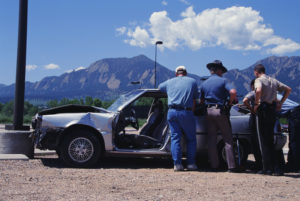
A Traffic Stop Is a Seizure
Everyone in the United States enjoys the protection of numerous important rights found in the U.S. Constitution. The majority of those rights are found in the first ten amendments to the Constitution, collectively known as the “Bill of Rights.” The Fourth Amendment protects your right to be free from “unreasonable searches and seizures.” Although the courts have watered down the protection afforded by the Fourth Amendment over the years, a traffic stop is a “seizure” under the Fourth Amendment. As such, your rights under the 4th Amendment that protect you against unreasonable searches and seizures do apply during a traffic stop.
To Consent or Not to Consent – That Is the Question
O.K., Maybe it isn’t quite that dramatic, but the question of consent to a search of your vehicle may very well come up during a traffic stop. Because the laws regarding searches of vehicles are complex, and subject to change, law enforcement officers frequently try to avoid the issue of probable cause to search by simply getting the driver to consent. By the way, only the driver of a vehicle can consent to search the interior of the vehicle. Officers will try to get a driver to consent by saying things such as “You don’t mind if I just have a look around do you?” or “You don’t have anything in the vehicle I should be worried about do you?” All too often a driver will agree without fully understanding that they just agreed to a search. Other times a driver will agree because they felt they had no other choice or because they felt it was better to admit that little bit of marijuana in the ashtray than to have the officer find it during a search.
You Can Refuse a Search
What you may not realize is that you have the right to refuse to consent to a search of your vehicle. That does not always mean the search won’t happen; however, it does force the officer to prove that the search conducted was legal. If the officer cannot prove the legality of the search, anything seized during the search will be inadmissible at trial. For a search to be legal, in the absence of consent, the officer must have probable cause. Here is where is get tricky. For purposes of this discussion, think of probable cause as a strong, reasonable suspicion that something illegal will be found in the vehicle. Probable cause must exist before the search is conducted for the search to be legal. If the officer does not have probable cause to search, he/she must give you your citation (if applicable) and let you go.
What about Searches by Drug Sniffing Dogs?
A final note about the use of K-9 units. This is an area that is very confusing for the average motorist. When can the police bring in a K-9 unit? A K-9 unit has dogs who are trained to smell controlled substances by sniffing the outside of a vehicle. If a dog alerts while sniffing the vehicle, that provides the necessary probable cause for a search. Stops involving a K-9 “sniff” tend to be very fact sensitive; however, the general rule is that a law enforcement officer cannot hold you beyond the time it takes to conduct the original reason for the stop. For example, if you were stopped for speeding, once the officer has checked your license and registration and written you a ticket, you must be released if a K-9 unit has not yet arrived. The officer cannot detain you longer just to wait for the K-9 unit to arrive.
Contact a Murfreesboro Criminal Lawyer
If you have additional questions or concerns about vehicle searches in the State of Tennessee, it is in your best interest to consult with an experienced Murfreesboro, Tennessee criminal lawyer as soon as possible. Contact the team at Bennett, Michael & Hornsby today by calling 615-898-1560 to schedule your appointment.
- The Art of Successful Co-Parenting During Divorce - April 19, 2024
- Elder Financial Exploitation: How to Protect Seniors - April 12, 2024
- How to Obtain Guardianship of a Minor in Tennessee - April 2, 2024




